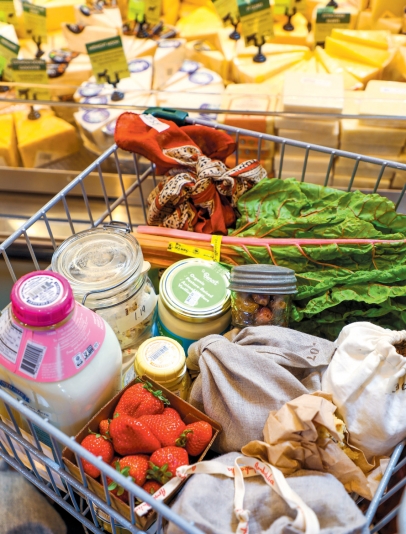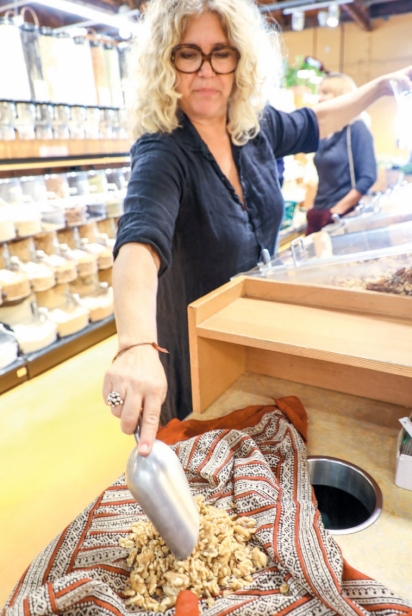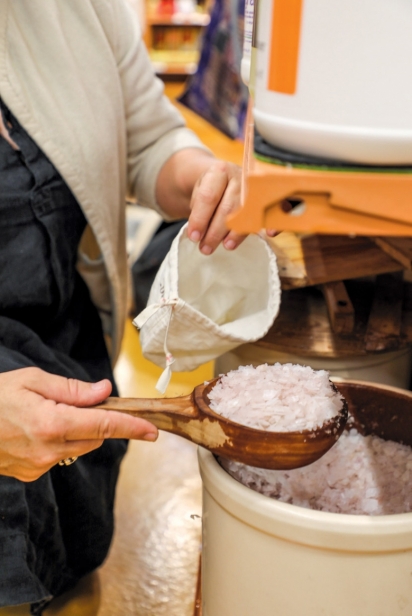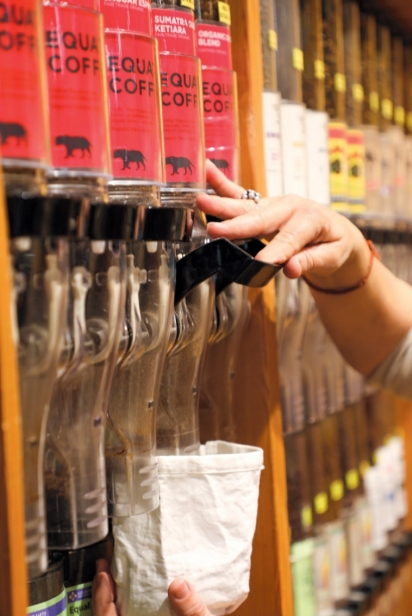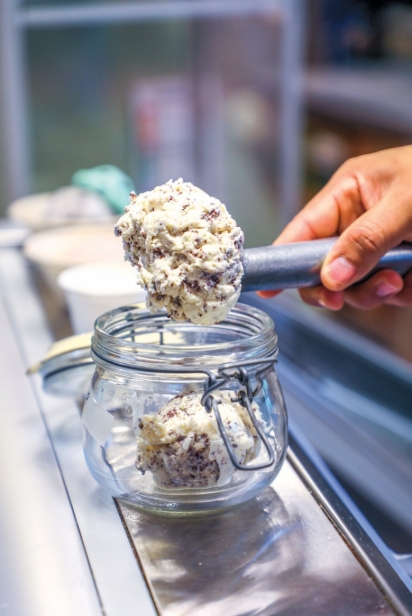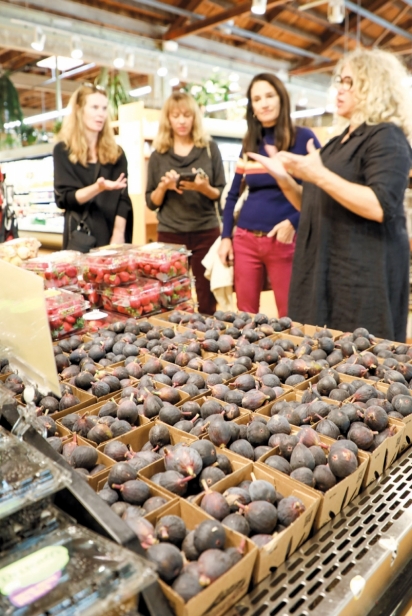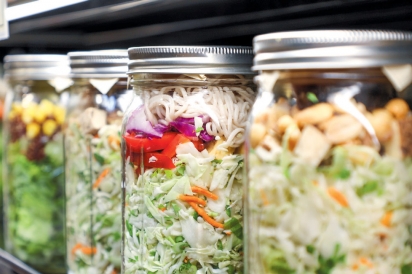Zero-Waste Grocery Shopping
Mill Valley native and local zero-waste guru Molly de Vries takes a small brown bag out of her purse and holds it up like cherished prize. She opens the sack and we, a group of wannabe zero-waste grocery shoppers (including this writer) gathered around a table at Good Earth Natural Foods in Tam Valley, peer inside to discover a dark, rich-looking soil.
De Vries—who regularly leads groups like ours on tours of the market to demonstrate the many easy ways we can cut down, or even eliminate, wasteful packaging in our grocery shopping—says she carries this well-aged compost to remind herself, and others, of the fundamental purpose behind zero-waste choices.
“This is what it’s really all about,” says de Vries, as she carries her collection of reusable containers and bags to the checkout stand for weighing. “When I think about food, I think about soil. Diverting waste from landfill into [usable] compost is the most important thing we can do.” After the cashier gives de Vries her tare weights (the various weights of her empty containers), we head toward the bulk aisles of the store and continue our discussion.
A pure composting process is critical for a couple of reasons: One, sending food waste to be processed into compost rather than the landfill reduces the release of methane—a greenhouse gas that is 28 times more potent than CO2; and two, the resulting compost can be used to nourish the soil of local farms, the very ones that provide produce to our local grocery stores. A virtuous loop.
De Vries is the owner of Ambatalia, a tiny shop in the Mill Valley Lumber Yard that offers a wide array of products that help consumers live a “non-disposable lifestyle,” the store’s tagline. Bringing our own reusable sacks, jars and other containers for bulk-bin items and choosing packaging-free grocery options keeps plastics and plastic-lined (poly-coated) products from contaminating food waste so it can be composted, and also reduces the waste going to landfill, de Vries explains. A pure and usable compost is one essential part of a “circular economy,” meaning an economy that reuses resources and does not increase the degradation of our environment through greenhouse gas emissions and plastic pollution.
Across the globe, as consumers increasingly question where all the trappings of our disposable lifestyles actually go, how our daily activities contribute to climate change and the toxicity of our soil, air and water, zero-waste grocers are popping up in countries as far and wide as South Africa, Malaysia, Italy and Hong Kong, as well as in cities across the United States. As recently as 2016, China accepted and repurposed 700,000 tons of plastic waste from the United States and 7 million tons from countries worldwide each year, but last spring China announced that it would no longer recycle the world’s trash. This new scenario, combined with the global climate reality articulated so clearly by Swedish teen Greta Thunberg and an increasing number of disturbing images of plastic-inundated wildlife habitats and animals made ill or strangled by our plastic refuse, has brought a heightened level of reflection and dismay about our own wasteful, plastic-dependent habits.
Here in the Bay Area, a recent report by the San Francisco Estuary Institute and Aquatics Science Center found that, each year, rainfall washes 7 trillion pieces of microplastics—that is 1 million pieces per Bay Area resident—into the SF Bay. Studies have also confirmed the existence of microplastics in our creeks, ponds, rivers and lakes. The plastics we toss out do not magically disappear. Indeed, they are affecting the health of all living organisms and the speed of climate change.
De Vries leads our group through the bulk aisles, filling her homemade organic cotton bento bags and glass jars of varying sizes with a wide array of items on her shopping list, including CBD bath salts, almonds, coffee and flax seeds. In the produce section, she puts tomatoes, chard and lettuce into bags and explains to the group that non-recyclable plastic bags, packaging and poly-coated cardboard cups and to-go containers are not only making their way into our natural ecosystems, they are contaminating our composting systems, interrupting the “cycle” part of recycling.
“Well-meaning people are confused and have the wrong information about coffee cups and to-go boxes,” she tells us. “There are basically no to-go coffee cups or containers that can be composted, due to the plastic lining.” Those poly-coated items are also difficult to recycle because it is hard to separate the paper from the lining, so they end up in landfill. The solution? Bring your own mug, Tupperware, Mason jar, Thermos, reused plastic bags or cloth bags for shopping and takeout. De Vries makes and sells beautiful homemade organic cotton items, and these make her grocery basket look especially gorgeous, but her message is clear and simple: “I want people to know that they should use any containers they have. Use whatever works!”
Good Earth Natural Foods, with stores in Tam Valley and Fairfax, is where de Vries does most of her shopping, as it is one of the best markets in the region for zero-waste shopping. According to Good Earth’s Director of Marketing Jessica Hurtado, who is also responsible for Good Earth’s public education programs around sustainable choices, this is because when the first store opened in Fairfax in 1969, the mission was to offer foods with a minimum of processing, chemicals and additives.
“Selling organic has always been our standard,” says Hurtado. “When Good Earth opened 50 years ago, organic food was often sold in bulk, so our customers were accustomed to bulk shelves. We have never stopped trying to find ways to make our stores more sustainable.”
Over the last decade, Hurtado says, the store has seen a rise in people wanting convenience foods, prompting management to assess how much packaging is in the food system in general and where they could adopt packaging-free options.
“What we have found is that in expanding our bulk, a place where people can do a lot of zero-waste shopping, that’s probably our best approach. We’ve been consistently growing the size of that department and last year we were able to convert all bulk food offerings to organic.”
When Good Earth stocks an item in bulk, they try not to also offer a packaged form of that item. Throughout the store, small signs called “shouters” educate and steer shoppers toward zero-waste choices. The store provides glass plates and metal silverware for all salads and hot foods that will be eaten in-store, and has created a deposit program, offering soups, salads, pestos, sauces, krauts and some desserts in reusable Mason jars.
“I thought we’d get some outrage from the community when we made that change,” says Hurtado, “but our customers have been very accepting, celebrating that success.”
According to Andy Cain, the co-founder, along with partner Janice Luke, of The Silo Package-Free Pantry, morale and encouragement around zero-waste shopping are very high, but actually changing habits is a big step that doesn’t always follow the enthusiasm. The Silo operates out of a handful of North Bay farmers’ markets (follow @TheSiloPantry on Facebook to find their weekly market schedule) to offer bulk staples (rice, beans, pasta, etc.), reusable containers and zero-waste home and personal products such as 100% sustainably produced wool sponges, package-free “shampoo bars,” and natural deodorant in reusable tins. “We get a lot of people who say, ‘Love what you’re doing, really appreciate what you’re doing, support what you’re doing,’ and unfortunately only 10% of those people stop and buy something,” says Cain. “People are just not in the habit. In the end, it takes a lifestyle change.”
Cain and Luke made a major lifestyle change themselves when they left their jobs in the aerospace industry to get into zero waste. Traveling the world and seeing the piles of plastic trash everywhere they traveled, it dawned on them that most of the plastic packaging came from U.S.–based companies.
“All of these American companies are proliferating plastic throughout the world, in places that not only don’t have recycling, but most of these places didn’t even have trash pickup,” says Cain. It affected the duo enough to prompt them to establish a business to help consumers understand the seriousness of the packaging problem and to offer items to promote a change of lifestyle. Like de Vries, Cain and Luke also want us to understand the shortfalls and misconceptions around recycling.
“Recycling actually works against us as a society because there is so much confusion on what’s recyclable and how it gets recycled and it varies, community to community,” says Cain. “For instance, San Francisco has very good recycling facilities. But not so much outside of SF, so things that are recyclable in SF are not recyclable in Marin or Sonoma and Santa Clara. And forget places like Kansas and South Carolina; they are lucky if they have any recycling.”
From Cain’s perspective, recycling lets us feel “off the hook” as we perpetuate a throwaway lifestyle. “We assume that is going to turn into something else, but statistics say that greater than 70% of all plastics that can be recycled end up in the landfill.” Indeed, a 2018 McKinsey & Company report found that only 16% of plastics are actually “reprocessed.”
Waste Management of Northern California (which operates Redwood Landfill in Novato) and Recology Sonoma Marin, will not accept plastics of any kind in the compost—even plant-based plastics, which most people believe are compostable—because of the risk of contamination of the compost going to their certified organic farmers.
One thing that would help, says Hurtado, is if all grocery stores in the area made the same changes.
“If we roll out a reusable container that is inexpensive to buy and consumers pay a deposit on it, that is a great system, but it is a greater system if every business in this area does something like that, because it is challenging for one business to force a dramatic change.” And, she adds, political initiatives designed to reduce the waste in our food system could catalyze these changes.
One small step in this direction is California Assembly Bill 619, which passed last July. This bill helps restaurants move past one of the barriers to allowing reusable containers: the sanitation and health code liabilities. AB 619 states that restaurants can allow customers to use their own reusable containers for left over food, and will not be held responsible to clean and sanitize the containers. Restaurants may also refuse to use a reusable, brought-from-home container if it is not clean—something Hurtado says the employees at their takeout counter have to do periodically.
Studies find that fewer people are cooking at home these days, which makes sustainable approaches in the restaurant industry all the more important. This past September, de Vries joined the Mill Valley Chamber of Commerce, Sustainable Mill Valley and Upstream, a national nonprofit promoting producer responsibility and sustainable products and policy, to host a zero-waste forum for food businesses. The meeting drew de Vries’s Mill Valley Lumber Yard neighbors Watershed, Flour Craft Bakery and BOL Marin, as well as approximately 20 other local restaurants and food businesses, and offered an in-depth discussion of employee education, compost contamination and plastic recycling.
Is it really that easy? As de Vries continues our tour at Good Earth, we wannabe zero-waste shoppers follow her to the butcher counter, where she asks that her chicken apple sausages go into a large Mason jar. Around the corner at the ice cream counter, scoops of chocolate chip ice cream go into a hinged-lid canning jar. And at the olive bar, olives and their brine go into an antique Mason jar. Heading toward the checkout, we admire her cart full of jars and bags of different colors, shapes and sizes—a work of art compared to the usual assortment of plastic bags.
“It’s fun to be creative and use our creative brains,” she encourages us. “Let’s start thinking for ourselves!”


